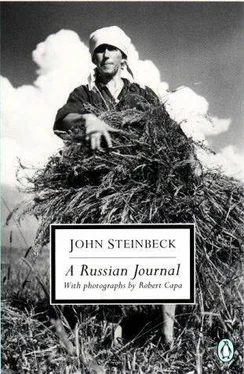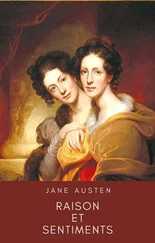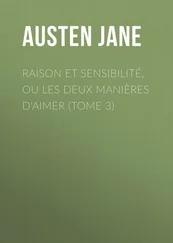John Steinbeck - A Russian Journal
Здесь есть возможность читать онлайн «John Steinbeck - A Russian Journal» весь текст электронной книги совершенно бесплатно (целиком полную версию без сокращений). В некоторых случаях можно слушать аудио, скачать через торрент в формате fb2 и присутствует краткое содержание. Жанр: Классическая проза, на английском языке. Описание произведения, (предисловие) а так же отзывы посетителей доступны на портале библиотеки ЛибКат.
- Название:A Russian Journal
- Автор:
- Жанр:
- Год:неизвестен
- ISBN:нет данных
- Рейтинг книги:4 / 5. Голосов: 1
-
Избранное:Добавить в избранное
- Отзывы:
-
Ваша оценка:
- 80
- 1
- 2
- 3
- 4
- 5
A Russian Journal: краткое содержание, описание и аннотация
Предлагаем к чтению аннотацию, описание, краткое содержание или предисловие (зависит от того, что написал сам автор книги «A Russian Journal»). Если вы не нашли необходимую информацию о книге — напишите в комментариях, мы постараемся отыскать её.
A Russian Journal — читать онлайн бесплатно полную книгу (весь текст) целиком
Ниже представлен текст книги, разбитый по страницам. Система сохранения места последней прочитанной страницы, позволяет с удобством читать онлайн бесплатно книгу «A Russian Journal», без необходимости каждый раз заново искать на чём Вы остановились. Поставьте закладку, и сможете в любой момент перейти на страницу, на которой закончили чтение.
Интервал:
Закладка:
Other less biased writers articulated intentions that often echo that of Steinbeck and Capa-to understand the people of Russia- but nets are cast far more widely. Edward Crankshaw, in Russia and the Russians (1948), sought "to produce a picture of the Russian people, their culture, and their political ideas, against the background of the unchanging conditions of their landscape and their climate." Descriptions of the great Russian plain and detailed synopses of Russian history absorb many pages of his tome, but the "living image of a distant people" emerges only as a series of statistics: twenty-five years ago, he reminds his readers, four-fifths of the Russian population was composed of peasants, while in 1948 only half are peasants. In Just tell the truth: The Uncensored Story of How the Common People Live Behind the Russian Iron Curtain (1947), journalist and president of the American Agricultural Editors Association John L. Strohn had a similarly ambitious agenda: "To see and talk with people of the Soviet Union, so I can introduce them through stories and broadcasts to the people of America… What I'm interested in are the common people." Visiting collective farms, he observes the damage caused by war, the absent men, and concludes-as does Steinbeck-that "it is the women who are the real heroes of the farm front-women who did practically all of the farm work during the war, who are doing even now 80 per cent of the work on collective farms today."
But the Russian women of Steinbeck and Capa, not absorbed in statistics and generalizations, strike more convincing poses: the village wit at the first communal farm who shakes a cucumber at Capa's camera. Or Mamuchka, renowned cook, owner of a new cow, Lubka, who hasn't the personality of her beloved former cow, Katushka. Capa's photos, like Steinbeck's prose, avoid the panoramic in favor of the portrait. Their joint commitment to record only what they could witness-based not on research or speculation but on visual record-is their full story. Paradoxically, their approach-to frame only what is seen-more accurately re-flects Stalin's Soviet Union, where visitors saw only scenes carefully orchestrated by Soviet officials. Journalists traced the same path Steinbeck and Capa did, the so-called Vodka Circuit, because Westerners were typically taken to Moscow, Kiev, and Tiflis, showplace cities all.
Reading several of these midcentury accounts undoubtedly supplements and enhances Steinbeck's text. Journalist Marshall Mac-Duffie, in The Red Carpet: 10,000 Miles Through Russia on a Visa From Khrushchev, writes about a 1953 trip, with reflections on his earlier experience in Russia in 1946. Puzzling on why Russians fed visitors so lavishly, he writes about his 1946 visit:
We were members of an accredited diplomatic UN mission. Possibly they thought they had to entertain us. Secondly, there was a shortage of food. So, in a curious way, the giving of a formal dinner or putting on a spread assumed a special significance, as a gesture. Third, I often suspected that our visit was an excuse for local officials to throw one of their rare parties on the old expense account and get a little rich food otherwise unobtainable. Lastly, it has been long a Russian custom to entertain foreign visitors in such fashion… Wherever our mission went, we encountered these relatively elaborate meals with the inevitable succession of numerous toasts.
Steinbeck and Capa were, of course, similarly feted, but Steinbeck eschews generalizations and analysis, opting for humor instead- particularly when seated at yet another dinner table: one Georgian banquet was the "only meal or dinner we ever attended where fried chicken was an hors d'oeuvre, and where each hors d'oeuvre was half a chicken." It's this humorous eye that skewers Soviet excess, and the quick sympathy for the generosity behind it all-vintage Steinbeck material-that account for this book's appeal.
A Russian Journal, the record of their forty-day trip to the Soviet Union between July 31 and mid-September 1947, was published in April 1948, after parts had been serialized in the New York Herald Tribune
(beginning on January 14, 1948, and running on page 3 of the paper until January 31) and in the Ladies' Home Journal (published in February). Like most of Steinbeck's work after The Grapes of Wrath, it received decidedly mixed reviews. Writing for the Saturday Review, Louis Fischer panned it-excepting Capa's "marvelous photographs." Some felt that the text trivialized a profound topic, or added little to the readers' knowledge of Russia, or rehashed what had already been written. "As books about Russia go," wrote Orville Prescott for the New York Times, " 'A Russian Journal' is a lot better written than most, but it is more superficial than many." Sterling North concurred: "The question arises: how superficial can books about Russia become… It could have been otherwise if the collaborators' knowledge of Russia, their interest in Russia and their attitude toward Russia had been above the level of eating, drinking and observing pleasant surface impressions." Steinbeck deliberately and consciously, of course, avoids historical context, political posturing, and in-depth analysis, as he reminds his readers throughout. And Capa reported later that, in fact, "on any occasion where questions were asked us about our feelings toward the policy of the United States Government we always stated emphatically that even if we were to disagree with some of its aspects, we would refuse to criticize it outside of the United States." Writing one of the most thoughtful and sympathetic assessments, however, Victor Bernstein mused: "I am not at all certain that this abnegation of the interpreter's role is justified merely because it is deliberate. It is an old, old fight in the theory and practice of journalism. How much of the unseen must go into a story to make it understandable, to get at its roots, to put it into perspective? How much of the unseen should Steinbeck put into his book to make it truly objective and not merely superficial?"
It was superficial, of course, only in light of what a few knew and more suspected was occurring in Stalin's Soviet Union. The United States' views of postwar Russia were, in fact, profoundly troubled. As Arthur Miller observed in his autobiography, Timebends, by 1947 "the Germans clearly were to be our new friends, and the savior-Russians the enemy, an ignoble thing it seemed to me… this wrenching shift, this ripping off of Good and Evil labels from one nation and pasting them onto another, had done something to wither the very notion of a world even theoretically moral." In these liminal years, the Soviet Union was a place few comprehended. A 1948 response to the book by a Ukrainian professor, then living in Munich, is entitled "Why Did You Not Want to See, Mr. Steinbeck?" What more could Steinbeck have seen is perhaps a better question. He knew more than he says, certainly-he'd been in the Soviet Union before, although he never commented on his and Carol's 1937 trip. But in 1947 he writes only what he sees-and he sees with a great deal of emotion and understanding-because those are the artistic parameters he set. And, once again, he saw only what the Russians permitted him or any other visitors to see, an updated version of the Potemkin village.
Other American reviewers found the book highly satisfying, "objective, impartial" and "readable because [Steinbeck] loves real people and because he has a sense of humor that never lets him down." "This is one of the best books about Russia since Maurice Baring wrote his 'Puppet Show of Memory' in 1922," effused the reviewer for the New York Sun. Steinbeck "has a most observant eye, a deadpan humor and a command of the English language unsurpassed by any American of our time. The Steinbeck style is one of the marvels of the age. It is entirely unpretentious…" Bernstein, among others, praised Capa's lens, which "suits the prose which surrounds it, lean and restrictive, without the furbelows of the self-conscious artist, and yet full of sensitivity and attention to detail." And supportive reviewers acknowledged that Steinbeck and Capa's book would help the West better "understand the Russians emotionally," a real contribution. Again, one of the most sensitive reviews posed a tough question: What were the political implications of such a book? Joseph Henry Jackson, writing for the San Francisco Chronicle, notes that the text would please no political faction-as the author himself admitted in his final paragraph. "A good deal here," notes Jackson, "will probably annoy the devout Left, for the two Americans, visiting with the best will in the world, were often irritated by the way things were done in Russia, by the miles of red tape that had to be unwound whatever they wanted to do…" He continues, "On the other hand, the case-hardened Right will also be irritated by the book, on the ground that nobody's got any right to be saying a good word on behalf of any kind of Russian excepting a dead Russian."
Читать дальшеИнтервал:
Закладка:
Похожие книги на «A Russian Journal»
Представляем Вашему вниманию похожие книги на «A Russian Journal» списком для выбора. Мы отобрали схожую по названию и смыслу литературу в надежде предоставить читателям больше вариантов отыскать новые, интересные, ещё непрочитанные произведения.
Обсуждение, отзывы о книге «A Russian Journal» и просто собственные мнения читателей. Оставьте ваши комментарии, напишите, что Вы думаете о произведении, его смысле или главных героях. Укажите что конкретно понравилось, а что нет, и почему Вы так считаете.











